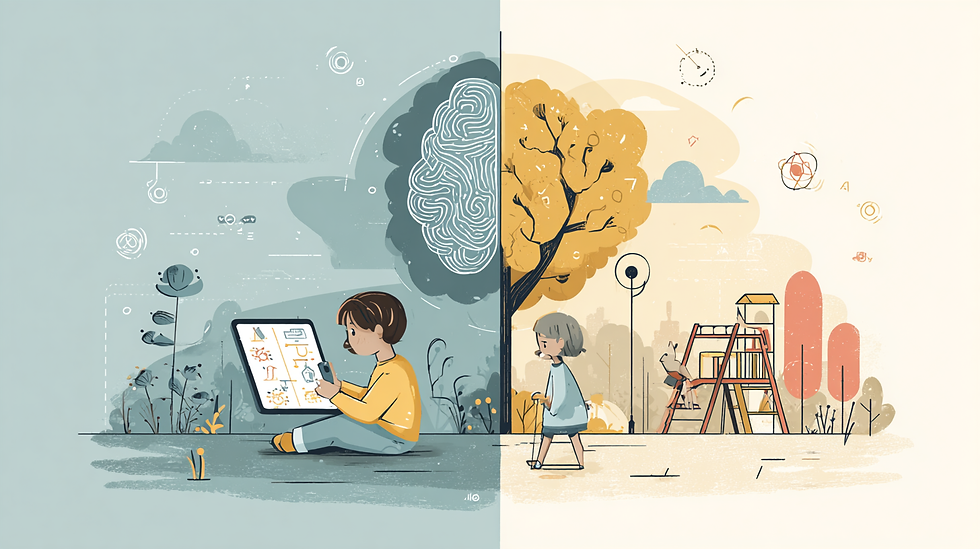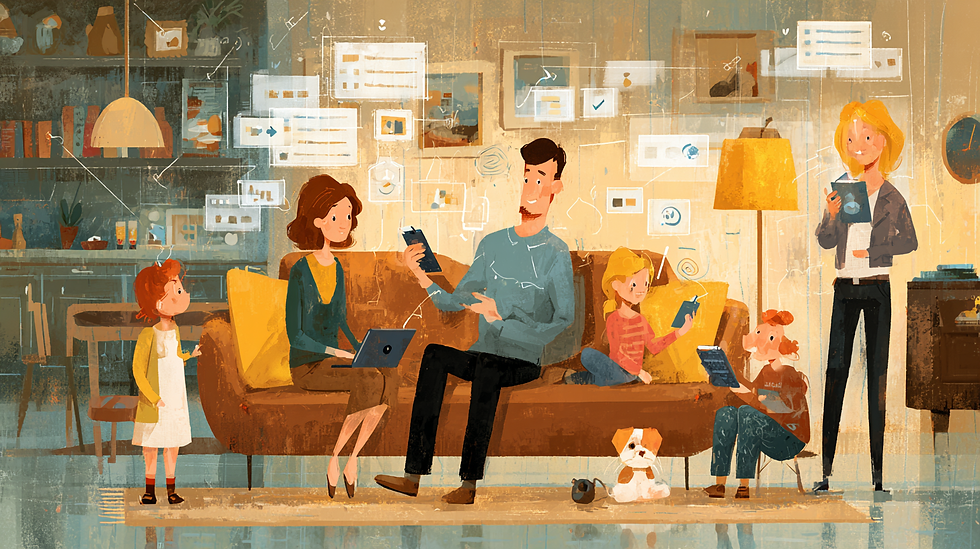Balancing Technology and Outdoor Play for Kids
- Cocoon Cotton

- Jun 17, 2025
- 4 min read

Your child is completely absorbed by a tablet screen while outside, birds are chirping, leaves are rustling, and endless adventures await. Sound familiar? As modern parents, we're navigating uncharted territory—raising children who are digitally fluent yet still connected to the natural world. The good news? This balance isn't just possible; it's essential for developing well-rounded, resilient kids who can thrive in our rapidly evolving world.
The Science Behind Smart Screen-Time Balance
Research from the American Academy of Pediatrics reveals that children aged 8-12 spend an average of 4-6 hours daily on screens, while teens can reach up to 9 hours. However, the goal isn't to eliminate technology entirely—it's about creating intentional balance that supports healthy development.
Dr. Pooja Tandon, a pediatrician and researcher at Seattle Children's Hospital, emphasizes that "outdoor play is essential for children's physical, emotional, and social development. It's where they learn to take risks, solve problems, and connect with the natural world." Studies consistently show that children who spend more time outdoors demonstrate better focus, reduced ADHD symptoms, and enhanced cognitive development.

Why Outdoor Play Remains Irreplaceable
Despite technological advances, outdoor play offers unique developmental benefits that screens simply cannot replicate:
Physical Development and Motor Skills: Running, climbing, and exploring naturally develop gross motor coordination while activities like collecting leaves, building with natural materials, and drawing in dirt refine fine motor skills essential for writing and future STEM activities. These physical experiences create neural pathways that support both academic learning and creative problem-solving.
Cognitive and Creative Growth: Nature provides an unstructured learning environment where children must invent games, solve problems, and use their imagination. A stick becomes a magic wand, a tree becomes a castle—this type of open-ended play fosters the creative thinking skills highlighted in our guide on the benefits of DIY activities for child development.
Emotional Resilience: Outdoor challenges help children build confidence, learn from failure, and develop emotional regulation skills. The calming effects of nature also reduce stress and anxiety, creating a natural antidote to the overstimulation that can come from excessive screen time.

Technology as a Bridge, Not a Barrier
Forward-thinking parents are discovering that technology, when used intentionally, can actually enhance outdoor experiences. Nature identification apps, geocaching adventures, and photography projects combine digital engagement with real-world exploration. The National Wildlife Federation suggests that thoughtful technology integration can deepen children's connection to nature rather than replace it.
Consider using devices to research outdoor discoveries, document nature journals, or plan family hiking adventures. This approach teaches children that technology is a tool for learning and exploration, not just entertainment.

How Cocoon Cotton Supports Active, Creative Play
At Cocoon Cotton, we understand that comfortable, durable clothing is fundamental to encouraging outdoor exploration. Our organic cotton garments are specifically designed to support the active play that's crucial for healthy development.
Freedom of Movement: Our breathable, flexible fabrics allow children to climb, run, and explore without restriction. When kids feel comfortable in their clothes, they're naturally more inclined to choose active play over passive screen time. This physical comfort directly supports the development of gross motor skills and encourages longer periods of outdoor engagement.
Creative Expression: Our DIY coloring t-shirts for kids offer a unique bridge between creative screen alternatives and hands-on activity. These aren't just clothing items—they're canvases for imagination that develop fine motor skills while providing a satisfying alternative to digital entertainment.
Durability for Adventure: Understanding the importance of organic cotton benefits for kids' clothing, our garments are designed to withstand outdoor adventures while remaining gentle on sensitive skin. This durability gives parents confidence to encourage messier, more adventurous play experiences.

Practical Strategies for Modern Families
Create Structured Balance: Establish clear "device-free" times and spaces, such as during meals or in bedrooms. Use these boundaries to naturally encourage outdoor exploration and family interaction.
Start Small: Begin with 30-minute outdoor breaks, weekend nature walks, or backyard exploration sessions. Even urban families can find opportunities through local parks or community gardens.
Engage in Age-Appropriate Activities: Different ages require different approaches. Our guide on games for 10-year-olds offers specific ideas that naturally incorporate both indoor and outdoor elements while reducing screen dependency.
Model Balanced Behavior: Children learn by observation. When they see parents enthusiastically participating in outdoor activities and setting boundaries around their own device use, they're more likely to adopt similar habits.
Invest in Comfort: Ensure children have appropriate clothing for outdoor adventures. Quality, comfortable garments remove barriers to exploration and make outdoor time more appealing than screen time.
Building Future-Ready Kids
The goal isn't to raise children who reject technology—it's to develop young people who can thoughtfully navigate both digital and natural environments. Children who learn to appreciate outdoor exploration while developing digital literacy are better equipped to make healthy choices throughout their lives.
By combining intentional technology use with rich outdoor experiences, supported by comfortable clothing that encourages active play, we're preparing children for a future where both digital skills and environmental connection will be essential for success and well-being.
The journey toward balance requires patience and creativity, but the rewards—confident, creative, and resilient children—make every effort worthwhile for families committed to raising well-rounded kids ready for whatever tomorrow brings.



Comments